Sleep Apnea and Heart Risk: How Untreated Breathing Issues Raise Blood Pressure and Trigger Arrhythmias
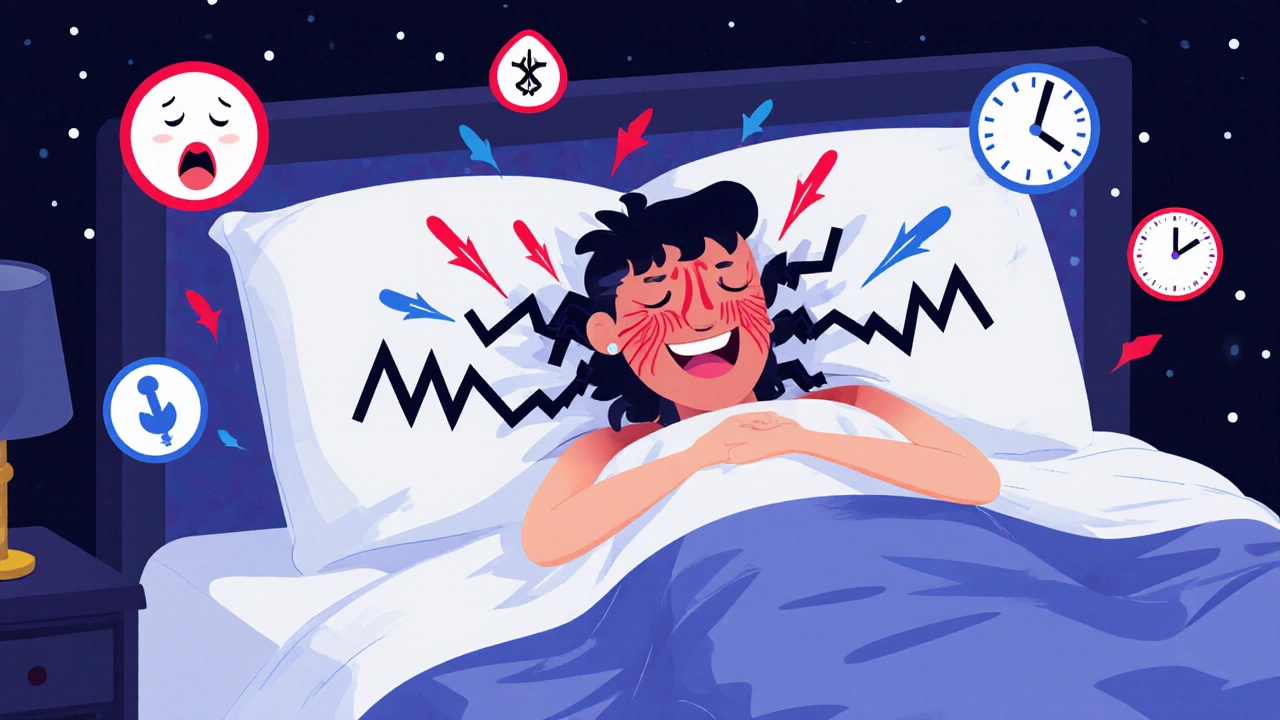
When you stop breathing for 10, 20, or even 30 seconds while asleep, your heart doesn’t just pause-it panics. Every time your airway collapses during sleep, your body is thrown into a stress response that spikes blood pressure, scrambles your heart rhythm, and slowly damages your cardiovascular system. This isn’t just snoring. This is obstructive sleep apnea, and it’s quietly raising your risk of heart attack, stroke, and irregular heartbeat-often without you even knowing it.
What Happens to Your Heart When You Stop Breathing at Night?
Imagine your airway closing like a straw being pinched shut. Oxygen drops. Your brain wakes you up just enough to gasp for air-but not enough for you to remember it in the morning. This cycle repeats dozens, sometimes hundreds, of times a night. Each time, your body reacts like you’re under attack.
Your sympathetic nervous system-your body’s fight-or-flight switch-fires off a surge of adrenaline. Blood pressure jumps 20 to 40 mmHg in seconds. Your heart rate races. Then, when you breathe again, your blood pressure crashes, your heart slows, and the whole cycle starts over. This rollercoaster doesn’t just happen at night. Over months and years, it wears down your blood vessels and heart muscle. By morning, your blood pressure doesn’t drop like it should. Instead, it stays high. That’s nocturnal hypertension, and it’s a direct result of untreated sleep apnea.
Studies show that people with severe sleep apnea (30+ breathing pauses per hour) are 40-50% more likely to have a heart attack, stroke, or heart failure than those without it-even when you control for obesity, diabetes, or age. The American Heart Association now lists obstructive sleep apnea as a Class I risk factor for atrial fibrillation, meaning the link is as strong as smoking or high cholesterol.
Why Sleep Apnea Causes Arrhythmias
Arrhythmias-irregular heartbeats-are one of the most dangerous outcomes of untreated sleep apnea. The most common type? Atrial fibrillation (AFib). People with sleep apnea are three to five times more likely to develop AFib than those who sleep normally.
Here’s why: the repeated drops in oxygen trigger inflammation and oxidative stress in your heart tissue. Over time, this leads to scarring, especially in the atria-the upper chambers of your heart. Scarred tissue doesn’t conduct electrical signals properly. That’s how erratic heart rhythms start. A 2024 study using cardiac MRI found that sleep apnea patients had 2.3 times more atrial fibrosis than people without the condition.
It’s not just AFib. Sleep apnea also increases the risk of ventricular arrhythmias, which can be life-threatening. The stress on the heart from low oxygen and pressure swings makes the electrical system unstable. Even if you’ve never had heart problems before, sleep apnea can be the trigger.
High Blood Pressure: The Silent Partner
One in three adults has high blood pressure. One in two of them has undiagnosed sleep apnea. That’s not a coincidence.
Traditional hypertension treatment often fails for people with sleep apnea because the root cause isn’t being addressed. Medications might lower your daytime pressure, but if you’re still stopping breathing at night, your heart is still under siege. Studies show that CPAP therapy-a treatment that delivers steady air pressure through a mask-can reduce systolic blood pressure by 5 to 10 mmHg on average. That’s the same drop you’d expect from a low-dose blood pressure pill.
And here’s the kicker: the American Heart Association now recommends screening for sleep apnea in anyone with resistant hypertension-blood pressure that stays above 140/90 despite taking three different medications. If you’re on multiple pills and still struggling, your sleep might be the missing piece.
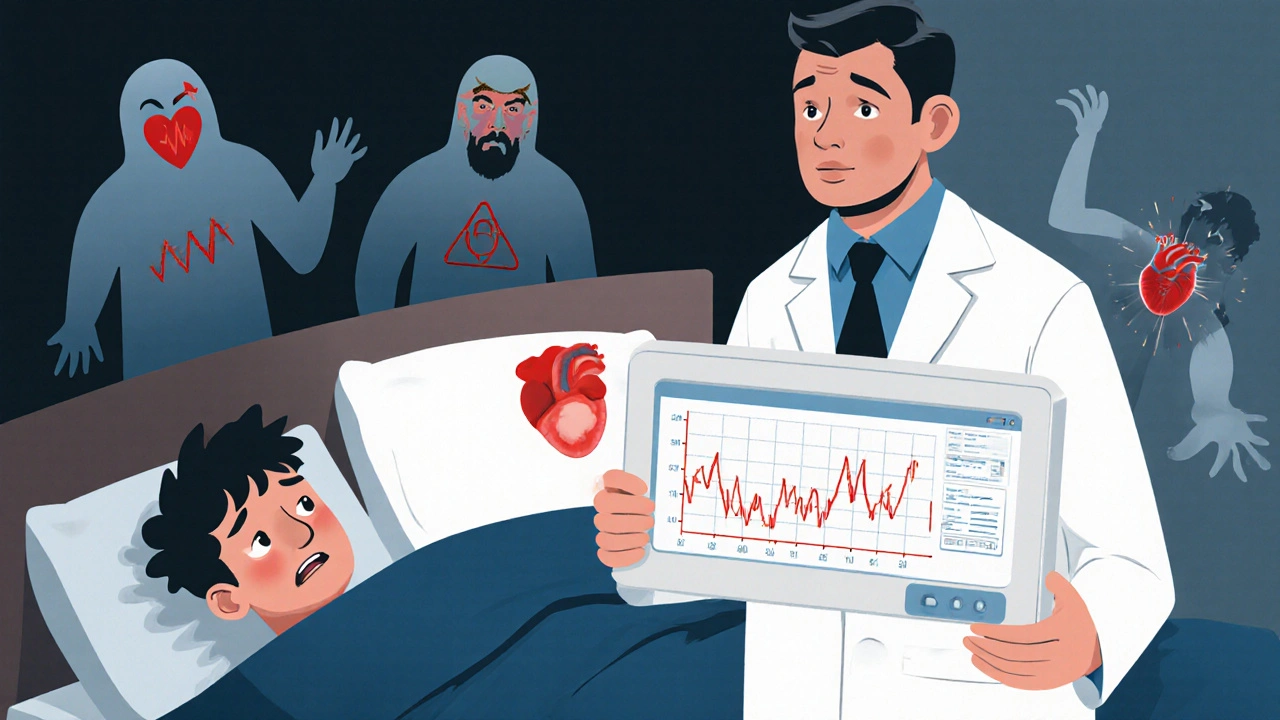
Who’s at Risk? It’s Not Just Older, Overweight Men
For years, sleep apnea was seen as a condition affecting middle-aged, overweight men. That’s outdated. New research from UT Southwestern Medical Center (2024) shows that sleep apnea increases heart risk even in adults under 40. Women, especially after menopause, are just as likely to have it. Thin people with narrow airways, people with a family history, or those with a large neck circumference (17 inches or more for men, 16 for women) are also at risk.
And here’s what most doctors still miss: you don’t need to snore loudly or feel tired during the day to have it. Many people with moderate to severe sleep apnea report no daytime symptoms at all. They just wake up with headaches, feel foggy, or notice their heart racing for no reason.
How to Know If You Have It
There’s no blood test for sleep apnea. Diagnosis requires a sleep study-either in a lab or at home. The test measures how many times you stop breathing per hour. That’s called your AHI (apnea-hypopnea index).
- Mild: 5-14 events per hour
- Moderate: 15-29 events per hour
- Severe: 30+ events per hour
If your AHI is 15 or higher, you have sleep apnea-even if you don’t feel tired. If you have high blood pressure, AFib, or have had a stroke, you should be tested regardless of symptoms. Studies show that 45-65% of patients with these conditions have undiagnosed sleep apnea.
Signs to watch for:
- Waking up gasping or choking
- Restless sleep or frequent nighttime bathroom trips
- Morning headaches or dry mouth
- Unexplained high blood pressure
- Heart palpitations or irregular pulse
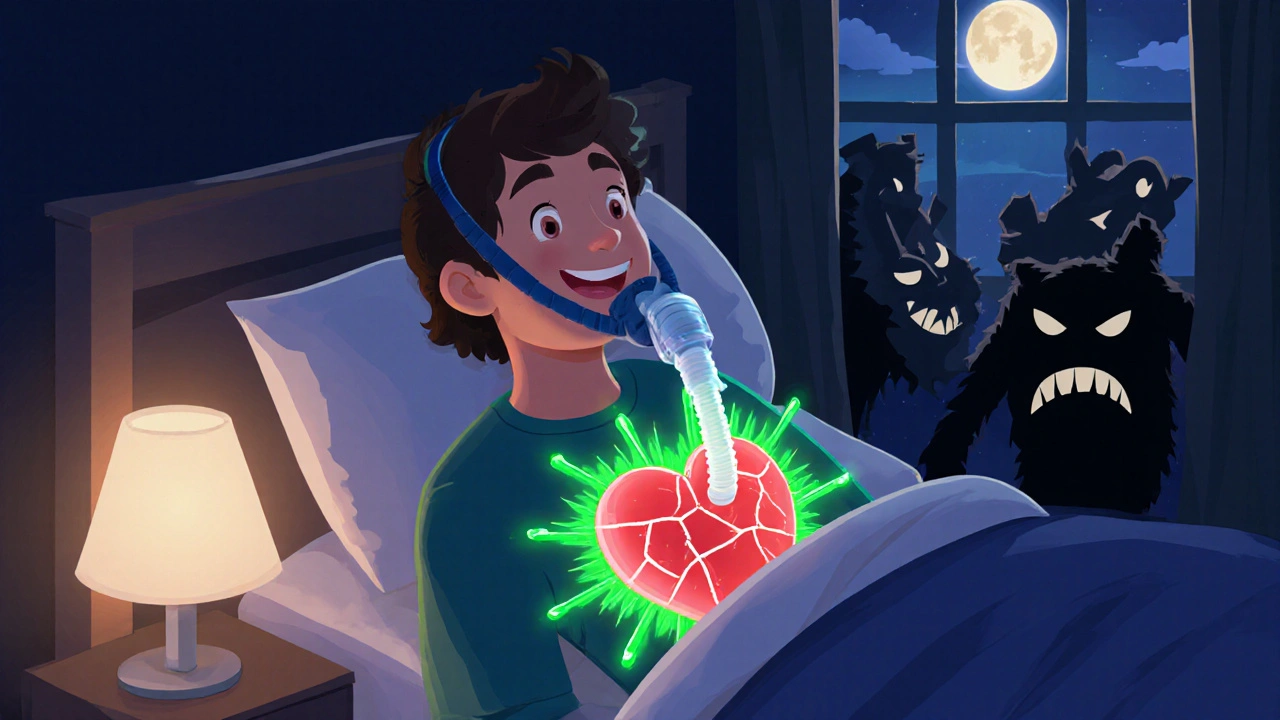
What Works: CPAP and Other Treatments
CPAP is the gold standard. It keeps your airway open with gentle air pressure. It’s not glamorous, but it works. After 12 months of consistent use, people with sleep apnea see a 42% drop in atrial fibrillation recurrence. Blood pressure improves. Daytime energy returns. Some people even reduce their blood pressure meds.
But adherence is the problem. About 30% of people quit CPAP within the first year. The mask feels uncomfortable. It’s noisy. It dries your nose. But most of these issues can be fixed. Humidifiers help. Different mask styles (nasal pillows, full face) work better for different people. Pressure settings can be adjusted. Ramp mode lets the pressure build slowly so you fall asleep easier.
For those who can’t tolerate CPAP, alternatives exist. Oral appliances that reposition the jaw help for mild to moderate cases. And for severe cases, a new implant called Inspire Therapy stimulates the nerve that controls the tongue to keep it from blocking the airway. In clinical trials, it reduced breathing pauses by 79%.
Why Treating Sleep Apnea Saves Lives
Unlike genetic risks or aging, sleep apnea is treatable-and the benefits are fast. One Reddit user, diagnosed with severe apnea (AHI 42), saw his blood pressure drop from 160/95 to 128/82 in just three months after starting CPAP. Another, who had weekly AFib episodes, saw them drop to once every two months.
The data is clear: treating sleep apnea doesn’t just help you sleep better. It protects your heart. It lowers your risk of stroke. It reduces the need for heart medications. And it can add years to your life.
Yet, only 20-25% of people who should be tested actually are. Primary care doctors rarely screen for it. Insurance covers the test, but you have to ask. If you have high blood pressure, an irregular heartbeat, or just feel like your sleep isn’t restful, don’t wait. Ask your doctor for a sleep study. Your heart will thank you.
Can sleep apnea cause heart failure?
Yes. Obstructive sleep apnea increases the risk of heart failure by 140%. The repeated stress on the heart from low oxygen and pressure swings weakens the heart muscle over time, especially the left ventricle. This leads to diastolic dysfunction-where the heart can’t relax properly to fill with blood. Many people with untreated sleep apnea develop heart failure without ever having had a heart attack.
Is sleep apnea only a problem for overweight people?
No. While obesity is a major risk factor, thin people with narrow airways, large tonsils, or a recessed jaw can also have sleep apnea. Women, especially after menopause, are at higher risk and often go undiagnosed because their symptoms differ from the classic snoring-and-tiredness profile. Sleep apnea doesn’t care about your weight-it cares about your airway structure and how your brain controls breathing during sleep.
Does CPAP cure sleep apnea?
CPAP doesn’t cure sleep apnea, but it controls it. When you stop using it, the breathing pauses return. However, consistent use prevents the heart damage and high blood pressure caused by untreated apnea. In some cases, significant weight loss or jaw surgery can eliminate the need for CPAP, but for most people, it’s a long-term treatment-like taking blood pressure medication.
Can sleep apnea cause atrial fibrillation even if I’m young?
Yes. Research from 2024 shows that obstructive sleep apnea increases the risk of atrial fibrillation in adults under 40. The damage from intermittent hypoxia and sympathetic overdrive doesn’t wait for middle age. Young people with untreated apnea are developing AFib at rates once seen only in older populations. If you’re under 40 and have AFib, you should be screened for sleep apnea-even if you don’t snore.
How long does it take for CPAP to lower blood pressure?
Most people see a drop in blood pressure within 3 to 6 weeks of consistent use, especially if they use CPAP for at least 4 hours a night. The biggest improvements happen after 3 months. One study found that patients who used CPAP 6+ hours per night lowered their systolic pressure by an average of 8.3 mmHg. That’s enough to reduce stroke risk by 20% over five years.
8 Comments
Aaron Whong
The pathophysiological cascade triggered by recurrent hypoxic-reoxygenation cycles in obstructive sleep apnea is a quintessential example of autonomic dysregulation as a primary driver of cardiovascular remodeling. The sympathetic overdrive isn't merely a compensatory mechanism-it's a maladaptive feedback loop that induces endothelial dysfunction, promotes systemic inflammation via IL-6 and TNF-alpha upregulation, and accelerates arterial stiffening through oxidative stress-mediated collagen deposition. The heart doesn't just adapt; it deteriorates in a quantifiable, time-dependent manner, with left ventricular hypertrophy and atrial fibrosis serving as biomarkers of chronic nocturnal stress. This isn't sleep disruption-it's systemic trauma, masked as benign snoring.
Sanjay Menon
Oh wow. Another one of those ‘sleep apnea is secretly killing you’ articles. So dramatic. So urgent. So… predictable. I mean, really-do we really need another 2000 words on CPAP? I’ve seen this exact post on five different forums. The only thing more exhausting than the article is the comment section that follows. Can we please move on? I’d rather read a textbook on quantum mechanics than another ‘your heart is panicking’ metaphor.
Marissa Coratti
While the clinical evidence presented here is both compelling and meticulously cited, I feel it is imperative to underscore the profound public health implications of this underdiagnosed condition. The fact that up to 65% of individuals with atrial fibrillation, resistant hypertension, or a history of stroke remain undiagnosed for obstructive sleep apnea represents not merely a medical oversight, but a systemic failure in preventive care infrastructure. Primary care providers must be empowered with screening protocols, insurance policies must eliminate prior authorization barriers for home sleep studies, and public education campaigns must dispel the myth that only overweight, middle-aged men are at risk. The data is unequivocal: treating sleep apnea is not optional-it is a cardinal intervention in cardiovascular risk mitigation. We owe it to our patients to act with urgency, not apathy.
Amanda Wong
CPAP doesn’t work for most people. You’re just pushing a placebo narrative. I’ve seen people use it for a month, then quit because it’s unbearable. And now you’re telling me it’s the ‘gold standard’? That’s like saying smoking is the gold standard for lung cancer prevention. The real problem is that doctors don’t want to admit they’ve been missing this for decades. They’d rather hand you a mask than admit they don’t know how to fix your airway. And don’t get me started on the ‘thin people can have it too’ line-yes, but it’s still 90% obese men. Stop pretending it’s a universal threat.
Joe bailey
Man, this hit home. I used to wake up every morning feeling like I’d run a marathon. No energy. Headaches. Blood pressure was through the roof. Doc said ‘just lose weight.’ I didn’t believe him. Then I got tested-AHI 38. Started CPAP. Three weeks in, I slept like a baby. Four months later, my BP dropped 15 points. I stopped one med. I’m not some medical expert, but if you’re tired, your heart’s acting weird, or your partner says you sound like a chainsaw-get checked. It’s not scary. It’s life-changing. You’ve got nothing to lose but the fog.
mohit passi
bro... sleep is the ultimate hack 🤯 your body fixes itself when you stop fighting it. cpap is just giving your heart a break from the war zone. no magic, no pills. just air. and yet we act like it’s sci-fi. we’re so disconnected from our own biology. breathe better. live longer. simple as that. 🙏
Ezequiel adrian
CPAP is a scam. They make you buy a $1000 machine to fix a problem they caused by selling you processed food and telling you to sit all day. Meanwhile, the real solution-sleeping on your side, losing weight, not drinking alcohol before bed-is free. But no, let’s sell you a mask and call it medicine. I’ve had apnea for 10 years. I sleep on my side now. No mask. No meds. My BP is normal. You’re being sold a product, not a cure.
Asia Roveda
Of course you’re all acting like this is some groundbreaking revelation. Wake up. This has been known since the 90s. The real problem? America’s healthcare system is designed to treat symptoms, not causes. You want to fix sleep apnea? Stop subsidizing corn syrup. Stop letting schools start at 7am. Stop making people work 12-hour shifts. But no-let’s just give people a mask and call it a day. You’re not saving lives. You’re just making the machine run smoother.
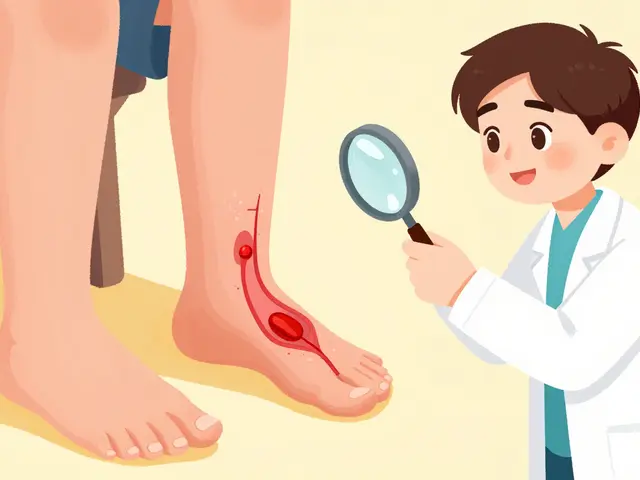
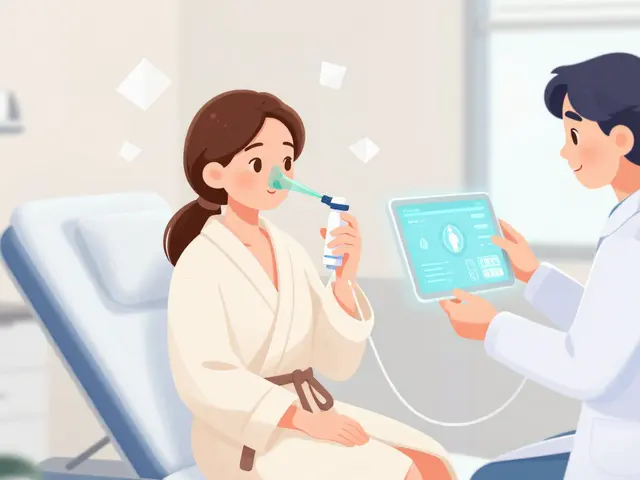
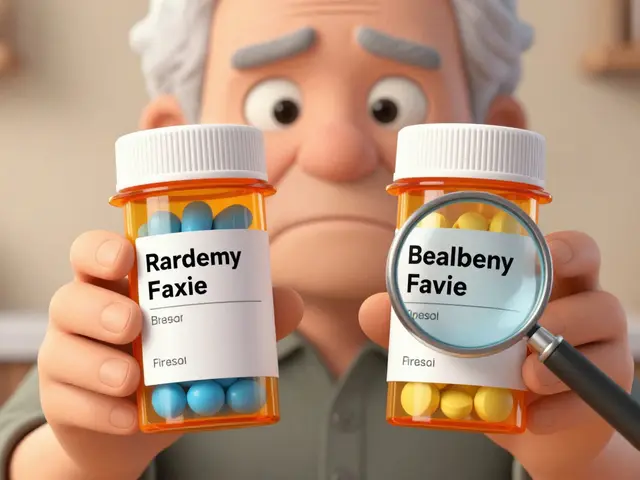



Write a comment